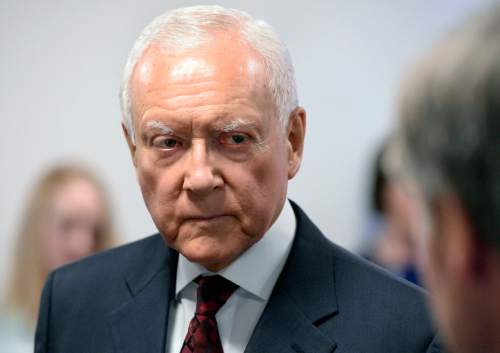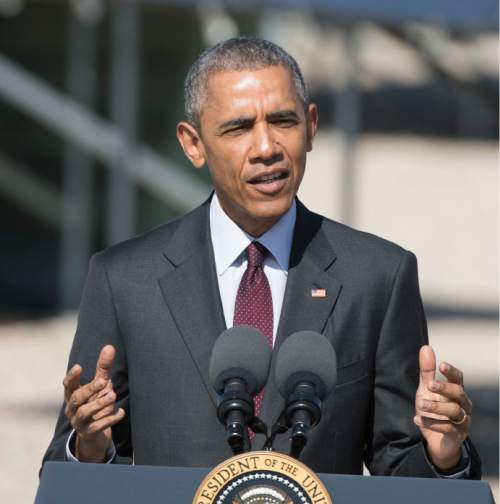This is an archived article that was published on sltrib.com in 2015, and information in the article may be outdated. It is provided only for personal research purposes and may not be reprinted.
Washington • When President Barack Obama made a whirlwind visit to Utah in April, he took a few minutes to praise Sen. Orrin Hatch for his help in pushing legislation that would fast-track pending trade agreements.
"Orrin Hatch is working very hard on that," Obama said at Hill Air Force Base. "Utah is one of the leading exporting states in the country, and part of the reason that this state has been so successful. And we're very grateful that Sen. Hatch is working with [Oregon] Sen. [Ron] Wyden to make sure that we can get that deal done."
That measure, the Trade Promotion Authority, passed Congress, but now with Hatch's help may actually doom the president's push for a transpacific-trade deal. The TPA allows Congress only an up or down vote on a trade deal without amendments, but it also mandates that the legislative body gets to review and suggest changes to the administration.
The Utah Republican may use the TPA's congressional-review power to force a change to the long-negotiated trade pact between the United States and 11 Pacific Rim countries.
The Utah Republican, chairman of the Senate Finance Committee, objects to part of the Trans-Pacific Partnership, specifically how it treats the intellectual property rights of U.S. pharmaceutical companies. But the stronger protections Hatch advocates are opposed by critics who say it will deprive poor people in many nations access to essential, sometimes life-saving medicines.
Hatch said he is trying to protect jobs and future investment in research.
—
Starting over? • "While I understand that parties have deemed the negotiations closed, the agreement cannot enter into force if Congress doesn't agree to it," Hatch told the U.S. Chamber of Commerce recently. "At the end of the day, [the U.S. Trade Representative] may need to go back to the negotiating table and try again. That result is not ideal, but it is certainly not unprecedented. I understand that renegotiation may be difficult, particularly with so many parties involved. But at the end of the day, the alternative to renegotiation may very well be no TPP at all."
Re-opening negotiations is problematic. The White House said such a move would be dangerous. Japan's minister called the deal a "glass ornament" that would break if re-opened.
"No, it would not be wise, after five years of negotiations with among 12 different countries, to try to renegotiate the agreement, particularly considering that the agreement was only reached a month ago," White House press secretary Josh Earnest said earlier this month.
Hatch said he wants to see the TPP become law, but adds that a number of lawmakers aren't happy with the final proposal and it could run into roadblocks if Congress was asked to vote on it now. TPP's details were only released a few weeks ago
"We fought very hard to enact a strong TPA bill into law," Hatch said. "And, we now have an obligation to make sure this agreement meets the high standards set by TPA and truly benefits American job creators, workers, and entrepreneurs. That's why we expect to undertake a rigorous review of TPP."
Hatch wouldn't say whether he'd hold up the trade deal — "I'm reserving final judgment on the deal until I've had ample time to vet it," he said — but adds that given its scope and complexity, Congress must take time to review all the details. Among Hatch's concerns, he wants to make sure the Obama administration can demonstrate that trading partners will meet their commitments under the deal.
"I'm hopeful that, at the end of the day, I, along with many of my colleagues, will be able to support a strong TPP," Hatch said. "But this is a once-in-a-life opportunity and we have to make sure we get it right."
—
Protecting drugmakers • Hatch has targeted one part of the deal in particular: TPP's limit on drugmakers' monopoly protections on their new medicines. Pharmaceutical companies had wanted, as part of the deal, a continuation of their exclusive rights for 12 years, as mandated under federal law, but the compromise trade plan only offers five to eight years of protections.
The pharmaceutical industry has long been Hatch's biggest campaign contributor. The Utah Republican has accepted nearly $2.3 million from individuals or political action committees tied to the industry during his 38-year Senate career, according to the Center for Responsive Politics. That doesn't include $750,000 the drug lobby's main trade group, Pharmaceutical Research and Manufacturers of America, chipped into his tough primary race in 2012 through a nonprofit group Freedom Path.
PhRMA also has been a big contributor — to the tune of $40,000 annually — to the Utah Families Foundation, a charity founded by Hatch and his wife a quarter century ago.
Hatch disputes any notion that his efforts are because of donations. He said it's all about jobs.
"I am concerned about protecting all types of intellectual property," Hatch said. "In the case of pharmaceuticals we need to make sure that an industry that provides more than three million high-paying domestic jobs, and nearly $800 billion to our economy every year isn't undermined by a poor trade deal."
—
Critics • Doctors Without Borders opposes the TPP and is particularly critical of the push for even greater monopoly protections for drug companies.
The 44-year-old humanitarian organization, which in 1999 won the Nobel Peace Prize, points to studies that have shown such intellectual property rights harm countries where medicines are in short supply.
In Jordan, for example, a 2007 study by the anti-poverty group OxFam found that rules set up by the World Trade Organization prevented poor people from accessing inexpensive, generic drugs or gain access to new, effective medicines. Another study, from 2009 and financed in part by OxFam, showed that the Central America Free Trade Agreement has kept some generic drugs from being available in Guatemala, and offered monopoly protections for drug makers to market some drugs without any competition. The price and supply of drugs for HIV/AIDS remains high and have strained public-sector budgets, the report said.
Rohit Malpani, director of policy and analysis for Doctors Without Borders' Access Campaign, said in a telephone interview from Paris that the TPP is the "worst-ever agreement" for those suffering and in need of medicines. He warned the trade rules established with the agreement could lead to further rationing of medicine and hike drug prices.
Changes championed by Hatch could make it even worse, he said.
"Mr. Hatch's perspective, from our perspective, is actually the wrong one," Malpani said. "It will worsen the crisis for affordable prices for drugs not only around the world but also potentially in the United States in the long term."
"The issue here is whether trade agreements should be negotiated on behalf of simply strengthening patent protection that goes beyond what is required under global trade rules because the pharmaceutical industry wants it, or should it simply reflect what is an appropriate balance between ensuring innovation and also ensuring access?" Malpani said. "We believe this agreement, unfortunately, strikes the wrong balance and will push many countries, either developed or developing in the wrong direction."
—
Uncertain road • Earnest, the White House press secretary, said drug companies have a "legitimate argument" that they should have some protection so they have an incentive to invest in expensive research and development that will yield lifesaving medicines.
He noted that five of the 12 countries involved in TPP currently have no data protection for drugmakers, so this "isn't a situation of the pharmaceutical industry needing to acknowledge that the glass is half full. They actually need to acknowledge that a previously empty glass is now almost entirely full."
The trade deal is a compromise not only to protect intellectual property, Earnest said, but also ensure those in need have access to medicine.
Hatch said he wants Obama to open up about possible changes to meet Congress part-way.
"If the President wants TPP to be approved," Hatch said, "he will need to work with Congress to address concerns."





